How to Fix ‘Intel Smart Sound Technology OED’ Not Starting Correctly
Some Windows users are experiencing a weird issue where their microphone and headphone functionality all drop at the same time. Upon investigating the problem inside Device Manager, there’s one particular service that seems to be causing the issue: Intel(R) Smart Sound Technology (Intel(r) SST) OED. This problem is confirmed to occur on both Windows 10 and Windows 11 and it’s most prevalent on Dell and Lenovo computers.
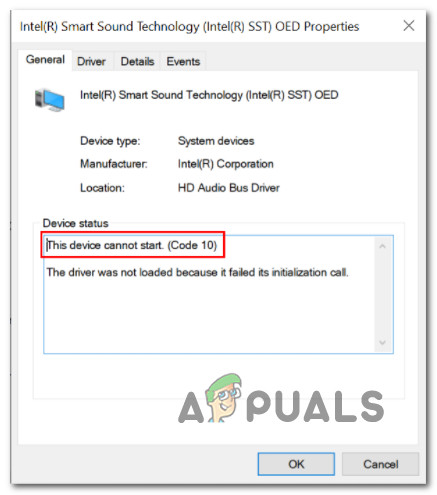
In case you’re dealing with the same kind of issue and you see the This device cannot start. (Code 10) or Failed to load external libraries as the listed reasons on why this service fails, there are a few fixes that other affected users have successfully used in order to fix this particular error code.
But first, let’s take a look at the most common culprits that might be responsible for these weird issues with the Intel(R) Smart Sound Technology (Intel(r) SST) OED service. Here’s a list of scenarios that you might be currently dealing with:
- Outdated Intel driver version – One of the most common causes for this error (especially for users that are already on Windows 11) is an outdated Intel Smart Sound Technology driver. This problem occurs because the Windows Update is not yet equipped to fetch the latest driver versions compatible with Windows 11. To resolve this issue (on both Windows 11 and Windows 10), use the DSA (Driver Support Assistant) to install the latest driver version compatible with your motherboard.
- Corrupted Smart Sound Technology driver – If you suddenly lost access to audio and audio recording, there’s a big chance you’re dealing with some kind of corrupted driver files. In this case, one way to deal with the issue is to uninstall the current Smart Sound Technology OED driver in order to force your OS to migrate to a generic equivalent.
- Incorrect Smart Sound Technology driver – Keep in mind if you’re facing this issue on a Lenovo or Dell laptop, chances are you’ll need to install the Realtek driver in order to fix your audio issues. This is only a requirement for certain laptop models, but you can easily attempt this fix by downloading the latest Realtek HD driver and installing it to see if it ends up fixing the issue in your case.
- OS Installation is missing some driver dependencies – Keep in mind that with certain PC configurations, you might need an additional Intel Media driver to ensure that your Windows installation is equipped to handle high-quality audio playback and audio recording. If the problem is occurring due to a missing Intel Media Driver, you can rectify the issue by installing the missing driver using the Microsoft Update Catalog.
- Incompatible dedicated driver – If you’re already on Windows 11, there’s a high chance the issue will return promptly as your OS overrides the generic driver with an incompatible dedicated equivalent. To prevent this issue from occurring endlessly, you’ll need to use Device Manager to force your OS to stick with the HD Audio Controller driver instead of always going for the Intel Smart Sound Technology driver.
Now that you’re up to date with every culprit that might stop the Intel(R) Smart Sound Technology (Intel(R) SST) OED service in its tracks, here are a couple of methods that other affected users have successfully used to fix this issue entirely.
Update Intel’s driver using DSA
Before you move over to other fixes, you should start simply by ensuring that you’re using the latest available version of the Intel(R) Smart Sound Technology.
But our advice is to not rely on Windows (Device Manager or Windows Update) to figure out if you’re on the latest version or not. With the upcoming Windows 11, there’s a lot of segmentation affecting the fleet of Windows drivers currently.
The best method of ensuring that you’re using the latest available version of the Intel(R) Smart Sound Technology is to run the proprietary Intel DSA (Driver Support Assistant) utility.
Running this tool to help you to figure out if you’re running with the latest Intel drivers installed. If your driver fleet is outdated, this tool will Auto-update your driver to the latest equivalents using the official channels.
If you’re looking for instructions on using the Intel Driver & Support Assistant to update your Intel(R) Smart Sound Technology driver, follow the step by step guide below:
- First things first, ensure that no unnecessary applications or processes are running in the background. Also, close off any potentially conflicting tools like Nvidia Experience, AMD Adrenalin, Driver Booster, etc.
- Next, open up your default browser and visit the home page of the Driver & Support Assistant utility.
- Once you’re inside the correct page, scroll down under Intel® Driver & Support Assistant (Intel® DSA) and click on the Download Now button.

Downloading the DSA utility locally - Once the download is complete, double-click on the installer that you’ve just downloaded and click Yes at the UAC (User Account Control) to grant admin access.
- Next, check the box associated with I agree to the term and conditions and hit the Install button.
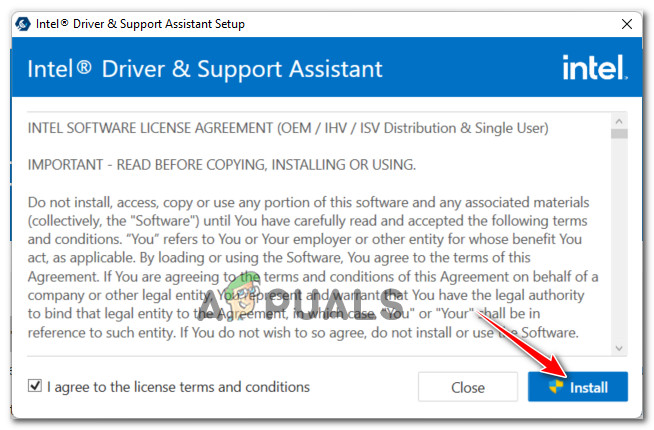
Accepting the TOS and installing DSA - At the next prompt, click Accept then click Yes at the UAC (User Account Control) and hit Install before waiting for the operation to complete. After the operation is finished, click on Launch and wait until the utility is open.
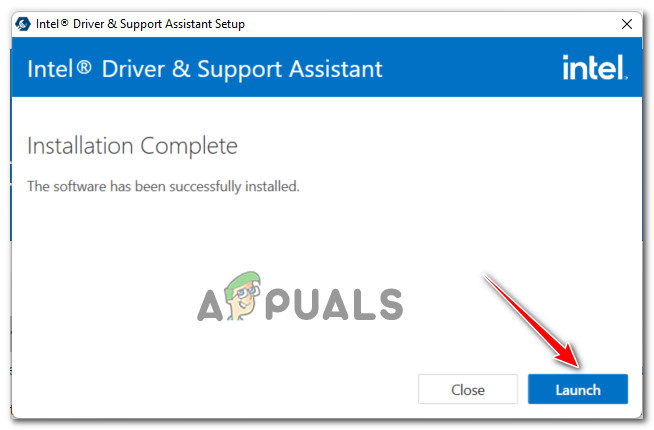
Launching the Driver & Support Assistant - Wait until the initial scan is complete, then click on the Download all button and follow the on-screen instructions to install every pending Intel driver.

Downloading the correct driver version - Wait until all the browsers are locally downloaded, then click on the Install All button to install them.
- After every pending Intel driver is updated to the latest version (including the smart sound technology driver), reboot your PC one final time and see if you regain audio and recording capabilities once the next startup is complete.
If the issue is still not resolved, move down to the next potential fix below.
Uninstall the Smart Sound Technology OED driver
This method might seem counter-intuitive, but it’s actually one of the most effective things you can do if you’re currently having issues with the Smart Sound Technology OED service.
If you end up using Device Manager to uninstall the driver that is currently governing this service, you will essentially force your operating system to migrate to a generic equivalent. And since the issue is only reported to occur in situations where the Intel dedicated Sound Technology driver is used, you can expect the issue to be resolved entirely once your PC begins using the generic driver equivalent.
Note: Don’t worry about losing audio or recording capabilities permanently. You will only experience a brief interruption while your Windows computer migrates from the dedicated driver to the generic equivalent.
If you haven’t tried this fix yet, follow the instructions below to learn how to get rid of Inte’s equivalent of the Smart Sound Technology OED and migrate over to a generic equivalent using Device Manager:
Note: The instructions below will work on both Windows 10 and Windows 11.
- Press Windows key + R to open up a Run dialog box. Next, type ‘devmgmt.msc’ inside the text box and press Ctrl + Shift + Enter to open up Device Manager with admin access.

Opening up Device Manager with admin access - When you’re prompted by the User Account Control (UAC) prompt, click Yes to grant admin access.
- Next, scroll down through the different device categories and expand the drop-down menu associated with Sound, video, and game controllers.
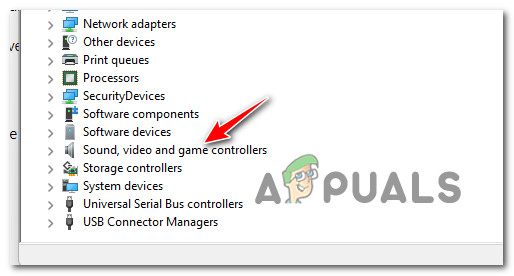
Expand the correct drop-down menu - Next, scroll down through the different sound drivers and locate the Smart Sound Technology OED service.
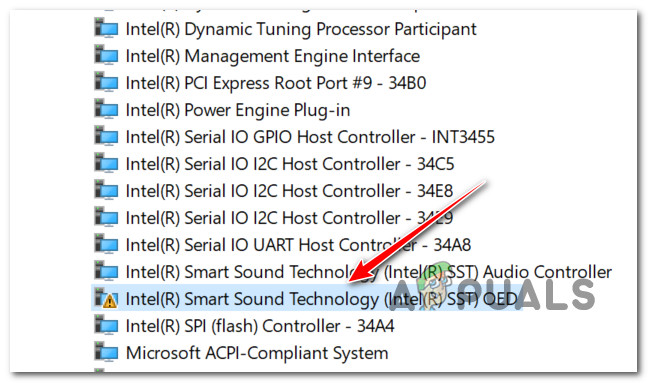
Uninstalling the problematic driver - When you see it, right-click on it and choose Uninstall device from the context menu that just appeared.
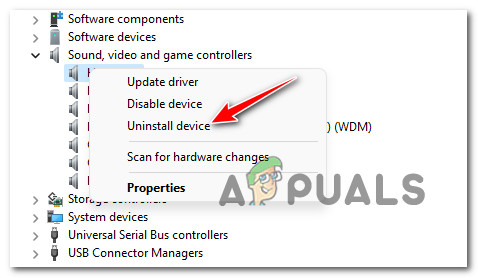
Uninstalling the problematic device - At the confirmation prompt, click Yes and wait until the uninstallation is complete.
Note: Before you click yes, check the box associated with Attempt to remove the driver for this device. - After the uninstallation is finally finished, restart your computer and see if you regain audio and sound recording capabilities at the next startup (once your OS migrates to a generic driver).
If you’re no longer seeing the error related to the Intel(R) Smart Sound Technology (Intel(r) SST) OED but you still don’t have any sound or recording capabilities, move down to the next potential fix below.
Install the correct Realtek HD Audio driver
Depending on your PC configuration, it might not be enough to make the switch to a generic driver.
If you’re using a Lenovo or Dell laptop, you might need to download the custom audio driver that the manufacturer recommends before you can get the issue fixed.
There are a lot of affected users who reported that the issue has been fixed after they moved away from the Intel driver equivalent to a solution provided by Realtek.
If you’re encountering this with a Dell or Lenovo laptop and your manufacturer recommends a Realtek driver, follow the instructions below to install the correct Realtek HD Audio driver version and avoid the apparition of the Intel(R) Smart Sound Technology (Intel(r) SST) OED error:
Note: The instructions below will be slightly different depending on your motherboard manufacturer. Below you’ll find an example of installing the correct Realtek HD driver equivalent for a Dell laptop. If your manufacturer is different, refer to the Note section for instructions on finding out the correct version in your case.
- First things first, you will need to uninstall your current driver. To do this. Press Windows key + R to open up a Run dialog box. Next, type ‘devmgmt.msc’ inside the text box and press Enter to open up Device Manager.

Opening up Device Manager with admin access Note: At the User Account Control prompt, click Yes to grant administrative privileges.
- Once you’re inside Device Manager, expand the menu associated with Sound, video and game controllers, right-click on Intel(R) Smart Sound Technology (Intel(r) SST) OED and choose Uninstall driver from the context menu.
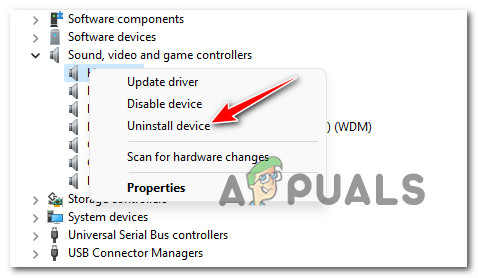
Uninstalling the problematic driver - At the next prompt, check the box associated with Attempt to remove the driver for this device first before clicking on Uninstall to get rid of the driver.
- Once the operation is complete, DON’T restart your computer. This is important since it will prevent your OS to install a generic driver equivalent.
- Instead, access the official driver download page of Realtek and download the latest version of the Reaktek driver (executable file) by clicking on the download icon (left section).

Download the correct Realtek driver equivalent Note: You’ll need to download the executable file (driver only) equivalent to your bit architecture. If you’re using Windows 11, download the 64-bit version. For Windows 10, press Windows key + R, type ‘systeminfo’, then check the System Type.
- Next, click on Download this file and wait until the installer is downloaded locally.
Note: In some cases, you might be prompted to complete a captcha verification process to prove that you are not a bot. - After the operation is complete, double-click on the Realtek HD Audio driver installer and follow the on-screen prompts to complete the installation of the latest driver version.
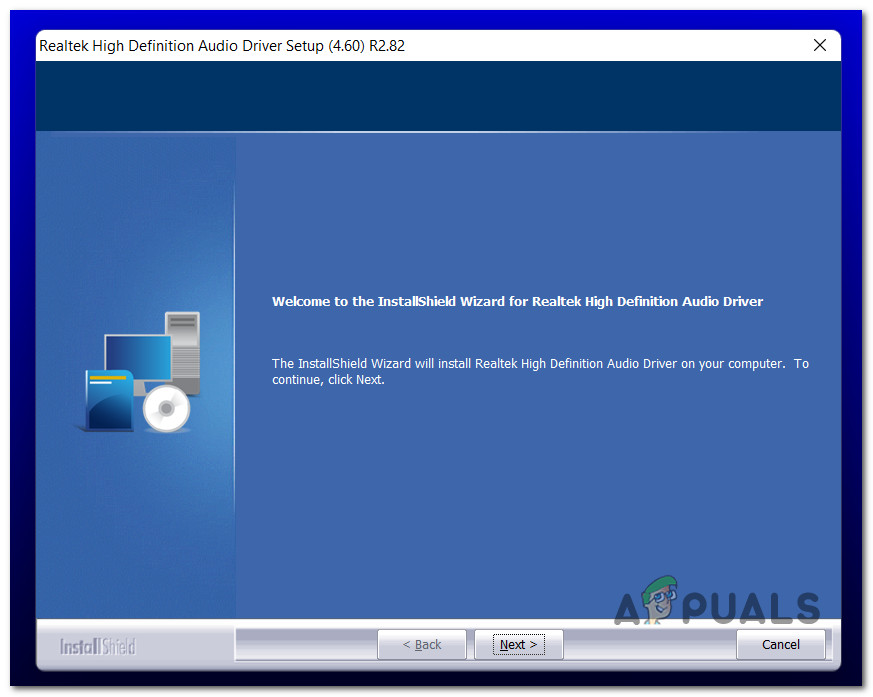
Installing the Realtek driver Note: At the UAC (User Account Control) prompt, click Yes to grant administrative privileges.
- Once the Realtek driver is finally installed, reboot your computer (even if you’re not instructed to do so and see if the problem is now fixed.
In case you’re still dealing with the same Intel(R) Smart Sound Technology (Intel(r) SST) OED error, move down to the next potential fix below.
Install the Intel Media driver via Microsoft Update Catalog
If you tried removing or replacing the Intel(R) Smart Sound Technology (Intel(r) SST) OED and you’re still dealing with the same kind of issue, you should start considering the fact that you’re encountering this error because you’re missing an optional driver that this driver requires.
According to some affected users, certain PC configurations will need an additional driver dependency that gets installed along with the driver Intel(R) Corporation – MEDIA – 10.29.0.5938.
If this scenario is applicable, you should be able to fix the problem by using the Microsoft Update Catalog infrastructure to download and install the missing driver dependency.
In case you’re unsure of how to do this, follow the instructions below:
- Open up your default browser and navigate to the home page of the Microsoft Update Catalog.
- Next, use the search function in the top-right corner to search for the following: Intel(R) Corporation – MEDIA.
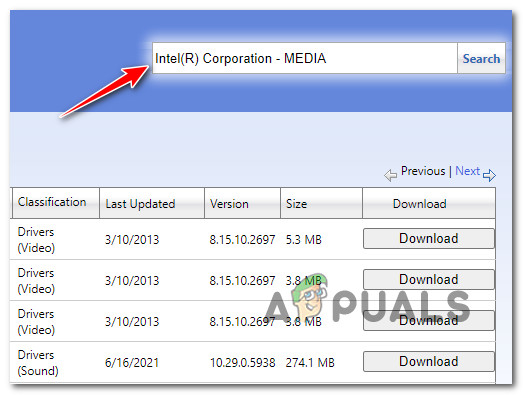
Downloading the supporting drivers - Next, once the results are generated, scroll down through the list of results and locate the correct Intel(R) Corporation – MEDIA – 10.29.0.5938 download according to which Windows version you’re currently on. Once you figure out which driver you need to get, hit the Download button and wait until the operation is complete.
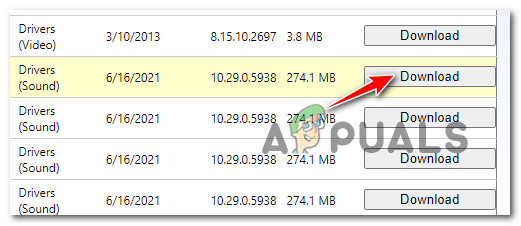
Download the correct driver Note: Make sure to differentiate between the regular Windows versions and the S versions. Download the regular version of the driver unless you’re on Windows 10 S or Windows 11 S.
- From the download prompt that just appeared, click on the hyperlink to initiate the download locally.
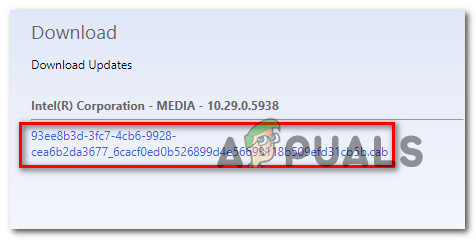
Download the driver locally - Once the download is finally complete, unpack the contents, then navigate the extraction folder.
- Inside the extraction folder, right-click on IntcOED.inf and choose Install from the context menu that just appeared.
- Wait until the process is complete, then reboot your PC and see if the Intel(R) Smart Sound Technology (Intel(r) SST) OED error is now fixed.
If the problem is still not fixed yet, move over to the final fix below.
Replace the driver with the HD Audio Controller
If none of the methods below have been effective in your case, one last thing you can try is to instruct your Windows installation to disregard the current driver and use the generic High Definition Audio Controller driver instead.
This should happen automatically when you uninstall the driver via Device Manager, but if you have DSA installed or a different utility, the issue will return as the bad driver gets reinstalled.
Follow the instructions below to use Device Manager to specifically instruct your PC to disregard the Smart Sound Technology driver from intel and use the High Definition Audio Controller instead.:
Note: The instructions below will work regardless if you’re using Windows 10 or Windows 11.
- Press Windows key + R to open up a Run dialog box. Next, type ‘devmgmt.msc’ inside the text box and press Enter to open up Device Manager.
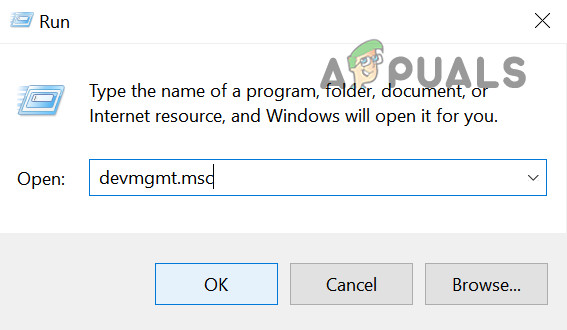
Open up Device Manager - When you’re prompted by the User Account Control.
- Once you’re inside the Device Manager, expand the drop-down menu associated with System devices.
- Next, scroll down through the different entities and right-click on Intel(R) Smart Sound Technology (Intel(r) SST) OED.

Uninstalling the problematic driver - Next, from the context menu that just appeared, click on Properties.
- Inside the Properties screen of the Intel(R) Smart Sound Technology (Intel(r) SST) OED driver, access the Driver tab, then click on the Update driver button.
- From the next menu, click on Browser my computer for driver software.
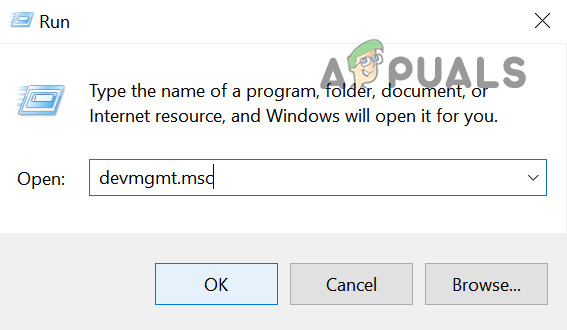
Browse my computer for driver software - Next, click on Let me pick from a list of available drivers on my computer.
- Once you get to the next screen, start by checking the Show compatible hardware box, then double-click on High Definition Audio Controller.
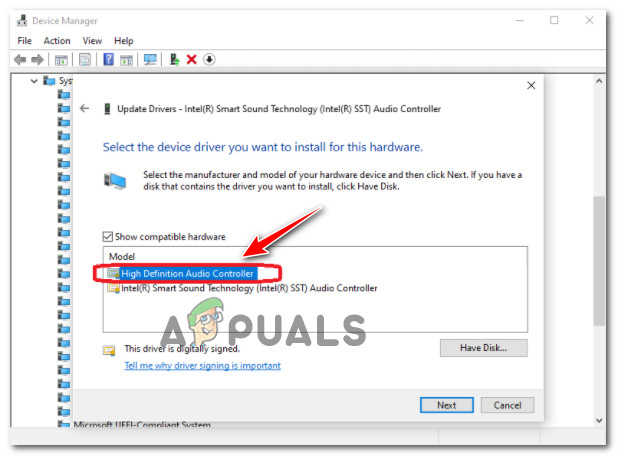
Audio driver - Wait until the drivers are installed then restart your system and see if your audio and audio recording capabilities have been restored at the next computer startup.





